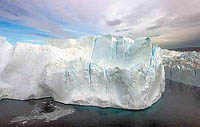Ice caps melting faster than forecast
Over the past 30 years, temperatures in the Arctic have been creeping up, rising half a degree Celsius with attendant increases in glacial melting and decreases in sea ice.

Experts predict that at current levels of greenhouse gases--carbon dioxide alone is at 375 parts per million--the earth may warm by as much as five degrees Celsius, matching conditions roughly 130,000 years ago. Now a refined climate model is predicting, among other things, sea level rises of as much as 20 feet, according to research results published today in the journal Science.
Modeler Bette Otto-Bliesner of the National Center for Atmospheric Research in Boulder and paleoclimatologist Jonathan Overpeck of the University of Arizona matched results from the Community Climate System Model and climate records preserved in ice cores, exposed coral reefs, fossilized pollen and the chemical makeup of shells to determine the accuracy of the computer simulation.
Roughly 130,000 the Arctic enjoyed higher levels of solar radiation, leading to increased warming in the summer and the retreat of glaciers worldwide. The model correctly predicted the extent of the resulting Arctic ice melt, enough to raise sea levels by roughly nine feet, reports Scientific American.
According to Reuters, by the end of this century, Earth would be at least 4 degrees F (2.3 degrees C) warmer than now, or about as hot as it was nearly 130,000 years ago.
Back then, significant portions of the Greenland and Antarctic ice sheets melted, pushing the global sea levels to about 20 feet higher than current levels.
A similarly dramatic, and in some cases catastrophic, rise in ocean levels could happen by the year 2500, Overpeck said in a telephone interview, but he noted it could come sooner.
"We know when the sea level was that high in the past, and we know how much warming is necessary to get that amount of sea level rise from both Greenland and Antarctica," Overpeck said.
The Earth will get that hot sometime early in the second half of this century, he said, and once it does, the big ice sheets will start melting "in a more dramatic manner" than they currently are.
A conservative estimate would call for sea level rises of 3 feet (1 meter) per century, he said.
O.Ch.
Subscribe to Pravda.Ru Telegram channel, Facebook, RSS!




